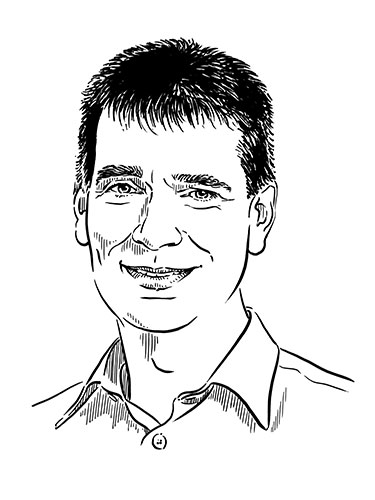Should the hidden carbon footprint of AI be regulated, Frank Krysiak?
Text: Frank Krysiak
Is a legal framework needed to regulate energy-intensive artificial intelligence applications? A debate between an environmental economist and a computer scientist.
Developments in the realm of artifi cial intelligence (AI) are proceeding at an ever-faster pace. A technology that used to be restricted primarily to specialist fields has given rise to applications with the potential to radically transform our everyday life, such as voice recognition or self-driving vehicles. The flipside of these developments is steadily growing resource consumption. Training AI applications is a hugely energy-intensive process that is expected to become a key driver of global electricity consumption in the medium term. On the surface at least, this runs counter to the aspiration of many industrialized nations to scale back their demand for energy. Accordingly, some studies have recommended regulatory interventions, for instance mandatory efficiency standards or a requirement to power computing centers with energy from renewable sources.
However, it is important to ask ourselves first whether the energy use inherent to AI applications is really a problem. Interestingly, there is no firm evidence for this as yet: the diversity of AI applications and the complex behavioral changes they often trigger makes it difficult to assess their overall impact.
Self-driving vehicles are a good example. On the one hand, this is a technology that requires intensive use of various AI applications involving extensive – and recurring – training. On the other hand, driverless vehicles have the potential to lower overall energy consumption in the mobility sector substantially: by eliminating the cost of a driver, public transport or cab journeys can be offered at lower prices. This makes car ownership less attractive, which in turn can lead to a significant reduction in energy and resource consumption in the vehicle manufacturing industry as fewer (but more efficiently utilized) vehicles are needed. Then again, we could also see a rise in demand for mobility services, so the technology’s overall effect on energy demand is difficult to predict.
Other AI applications, meanwhile, such as tailored advertising in the marketing sector, offer far less – if any – potential for energy savings, and are therefore likely to contribute to an increase in energy consumption. Alongside the energy issue the social benefits of these applications must, however, also be taken into account. In any case, there is no question that it makes sense to design the framework conditions governing AI applications in a way that encourages those applications with the greatest benefit to society on the one hand, while mitigating adverse effects such as increased energy consumption on the other.
For the first aspect, it would be helpful if electricity prices would accurately reflect the real cost of producing a MWh of power, including the associated environmental damage. This would mean that the energy-intensive training of AI applications would only come into play for applications promising greater value. Still, realistic electricity prices remain a distant prospect in the vast majority of countries.
The second goal could be pursued by exploiting the fact that training AI applications is flexible, in terms of both time and space. The increasing use of renewable energy sources with fluctuating output means there are times during which a particular region produces more electricity than it consumes. Shifting energy-intensive applications such as AI training to times and places with excess electricity would probably render the additional consumption largely irrelevant. Many countries, however, lack sufficient incentives such as electricity pricing designed to counter regional shortages. Tweaking these framework conditions could result in stronger incentives and render concerns about the energy consumption of AI applications all but obsolete.
Frank Krysiak is Professor of Environmental Economics at the University of Basel and head of the SCCER CREST energy research center. He works primarily on the long-term effects of environmental and energy policy on technological progress
More articles in the current issue of UNI NOVA.

